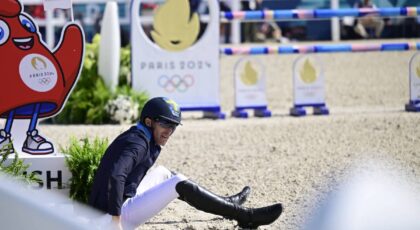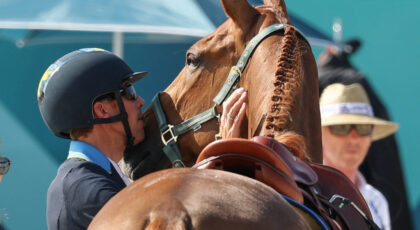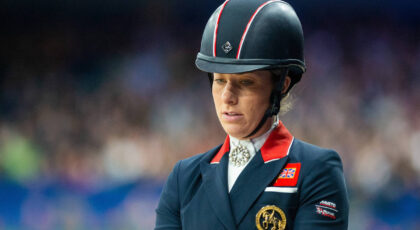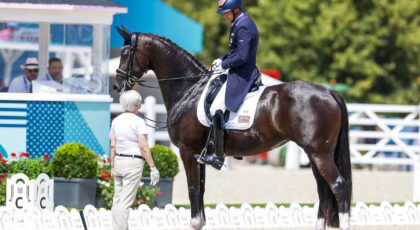I was recently working with a C-suite professional on developing a number of performance and leadership pieces and made the comment to her that these ideas could be directly transferable to her passion—show jumping.
“Oh, I’ve never really thought of it that way,” she said to me.
I explained that many of the key performance pieces we were working on day to day in her professional environment could be transferable to helping her develop into a more accomplished rider. And, if you are a business professional, the same formula can be applied to you.
Let me explain…
I have the wonderful privilege of working with both leading executives and some of the world’s leading athletes. My athlete clients include professional equestrians. While the performance model is slightly different to generate results with executives and equestrians, there are some common structural threads that are fundamental to both.
I’d like to share with you a few fundamental pieces that have undoubtedly made you successful in your professional life and how you might consider using them to maximize your abilities in the show ring.
Vision
You understand the importance of vision in your professional life. In order to move an organization forward there must be agreement where you want go. This is job #1—create and agree on the vision. But then, once you do that, what’s the plan to get there? What are the steps and actions that will move you closer to that vision? If you are a successful professional, you have done this and likely done it well.
So what’s your vision for your riding? Do you have a detailed plan to pull you toward where you’d like to go with your riding? If you don’t, how are you planning on developing as a rider to further enjoy the sport? Unlike your professional process, are you leaving your riding performance to chance and hoping it will randomly kick into high gear?
My recommendation here is that, like your professional practice, envision where you’d like to go with your riding and then carefully craft the steps and actions it will take to get there. If you do this, your riding path will be considerably more predictable, more enjoyable and you’ll have a much better opportunity to maximize your abilities.
Values
If you are a successful professional, you also know the critical role of values—to both shape culture and enhance decision-making. If performers in an organization don’t know what they believe in, how can they possibly be in alignment and make consistent decisions? If you are a part of a successful organization, you know that the organization’s values should be at the heart of the day-to-day operations.
So we know values play an important role in your professional life, but what role could they play in your riding?
Well…imagine if you had a separate set of values for your equestrian life that guide your riding behaviors and actions? A detailed structure you could depend on each day to guide you toward the vision we talked about? Well-constructed values can make a significant difference in your riding performance by helping you define what you believe in and what’s important to you—day to day.
Here’s one simple example using “Professionalism” as a chosen value …
Professional: I will be professional in how I ride including my preparation, my interaction with others around the barn, how I regulate my emotions during my performances, how I carefully reflect on performances to ensure step by step improvement, etc.
My recommendation is that you understand what you believe in—in your riding, what is most important to you and then formulate five key values and the associated behaviors and actions that will help make the values come alive each day in your equestrian life.
Self-Awareness
In my experience working in performance the past 20 years, self-awareness is the critical piece in determining how well a performer will do in the long-term. As a professional, you know that a lack of self-awareness in an individual can lead to fundamental problems in an organization. If a corporate performer does not understand how their emotions impact them and others from moment to moment, identify their strengths and limitations and leverage strengths, they will not maximize their own abilities and the abilities of others in an organization.
Why is self-awareness important in your riding?
Well…consider that emotions run the show in sport performance. So, if you do not have a full understanding how your emotions are impacting your riding, it can be both frustrating and very detrimental to riding performance. Further, remember that your emotions also impact the performance of your horse!
My recommendation is that you make building self-awareness in your riding a priority.
To begin, consider the follow questions:
- What are your emotional triggers in your riding?
- How do your emotions impact your horse?
- What are your strengths in riding?
- What are your limitations in riding?
- Do you clearly understand your purpose in riding?
- Do you understand how your confidence might fluctuate and why?
I think these three examples are a great start for you to consider how your professional practices can be transferred to your riding life and help you maximize your riding abilities. As a successful professional, there are a number of opportunities to apply the practices that have helped contribute to your success in your professional life that will help you unleash your potential in your riding life.
About the Author
John Haime is President of New Edge Performance. A world-class Human Performance Coach, former professional athlete and current best-selling Author of You are Contender! Build Emotional Muscles to Perform Better and Achieve More, John understands how athletes think and feel. His clients include some of the world’s leading organizations and some of the world’s leading athletes. John coaches leading professional equestrians and up-and-comers with the proven New Edge Performance system. See www.johnhaime.com to learn more.




 August 7, 2019
August 7, 2019 




























